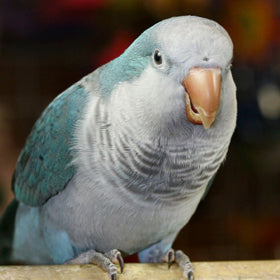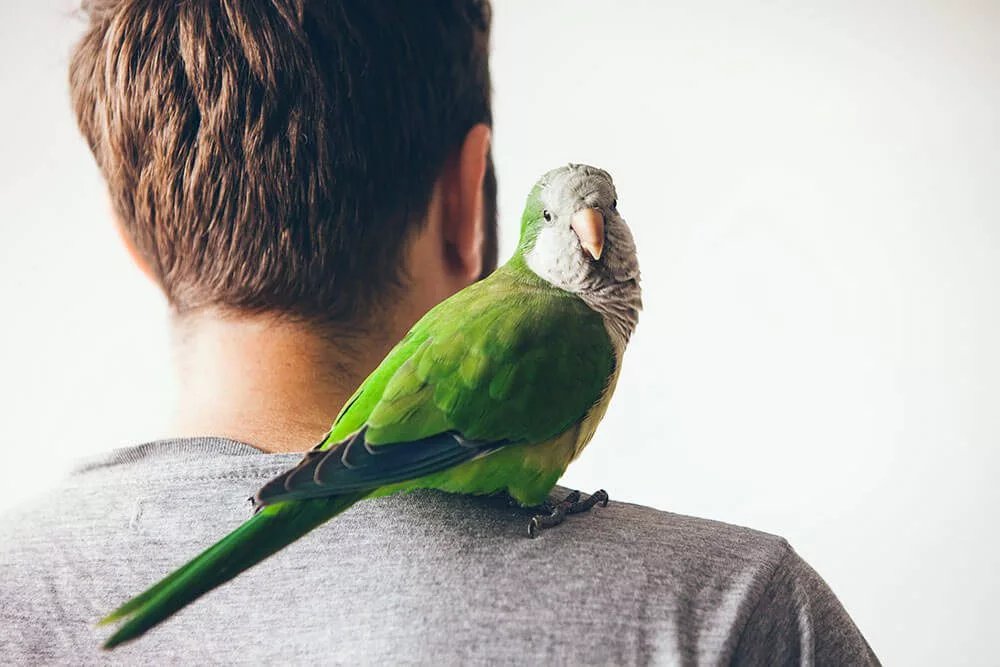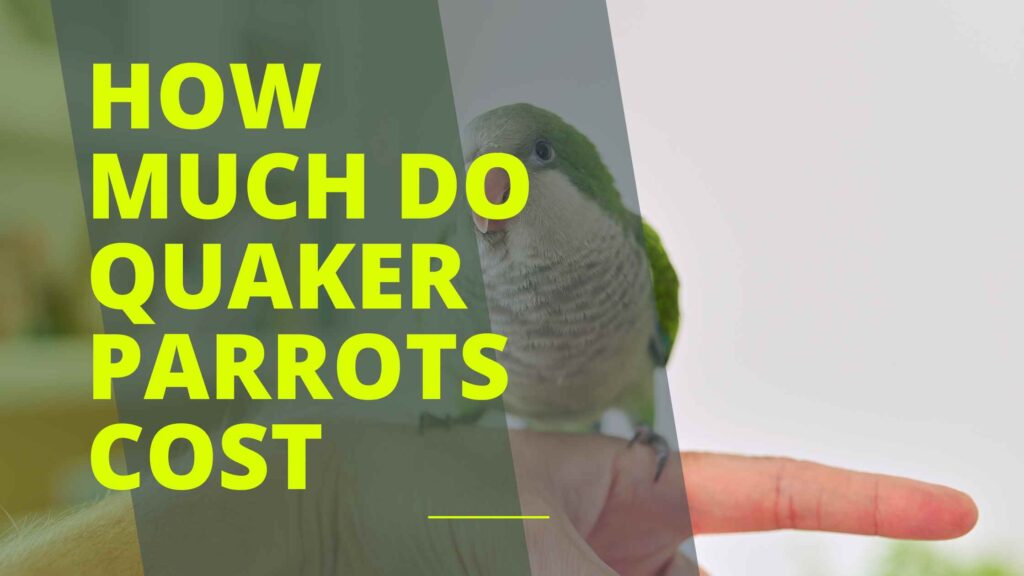Quaker parrots typically cost between $250 to $550. The price varies based on factors such as age, color, and breeder reputation.
Quaker parrots, also known as Monk Parakeets, have soared in popularity as pets due to their social nature, intelligence, and talking ability. These birds are known for their quirky personalities and capacity for forming strong bonds with their owners. Originating from South America, Quaker parrots thrive on interaction and mental stimulation, which makes them excellent companions for families and individuals alike.
How Much Do Quaker Parrots Cost? When choosing a Quaker parrot, potential owners should consider not just the purchase price, but also the long-term costs of proper care, including a nutritious diet, toys, and regular veterinary check-ups to ensure the wellness of these charming and affectionate feathered friends.

Credit: goldencockatoo.com
The Quaker Parrot: A Feathered Companion
The Quaker Parrot, also known as the Monk Parakeet, is a vibrant bundle of energy that has captivated bird lovers worldwide. These small to medium-sized parrots stand out with their charming personalities and are quite popular among avian enthusiasts. If you’re considering adding a Quaker Parrot to your family, understanding the costs involved is crucial. Let’s delve into what makes these birds so special, covering characteristics that contribute to their charm and the intelligence that makes them an engaging pet.
Characteristics And Charm
Quaker Parrots boast a striking green plumage accented with a grayish breast and blue-tipped wings. Adults reach about 12 inches in length, making them a perfect size for most homes. These birds are known for their:
- Playful nature – They enjoy interactive toys and puzzles.
- Distinctive Quaker shake – A quirky dance that endears them to many.
- Sociable attitude – Quakers thrive on interaction with their owners.
Your feathered friend’s care also involves a balanced diet, a spacious cage, and regular vet checkups. These necessities impact the overall cost of Quaker Parrot ownership.
Behavior And Intelligence
Quaker Parrots exhibit remarkable intelligence for their size. They are capable of:
- Learning a vast vocabulary – Some can learn more than 100 words.
- Mimicking sounds – Your bird may copy household noises or even songs.
- Problem-solving – Puzzles and toys will keep their minds engaged.
Such smart birds require constant mental stimulation. Without it, they might become bored or even develop behavioral issues. Their high intelligence can often translate to a need for more elaborate enrichment, which can factor into ongoing expenses.
When determining the price of a Quaker Parrot, consider not only the initial purchase but also the long-term costs associated with their care. Initial costs typically range from $100 to $600, depending on the bird’s age, color, and breeder’s reputation, while ongoing expenses include food, vet care, toys, and more.

Credit: gregrichdvm.com
Initial Costs Of Quaker Parrot Ownership
Welcome to the colorful world of Quaker parrots! These vibrant feathered friends bring joy to families with their playful antics. Starting your journey with a Quaker parrot involves initial costs that are important to consider. This section will guide you through the purchase price variances and the choices between buying from a breeder or adopting.
Purchase Price Variances
The cost of a Quaker parrot can vary widely. Factors such as color, age, and genetics play a role. On average, expect to pay anywhere from $100 to $450. Let’s break down the factors:
- Color: Standard green Quakers are often less expensive than blue or other rare color mutations.
- Age: Younger birds typically cost more than older ones, given their longer expected lifespan.
- Genetics: Birds with unique or desirable traits may carry a premium price.
| Color | Price Range |
|---|---|
| Green | $100 – $250 |
| Blue | $250 – $450 |
Breeder Vs. Adoption Options
Deciding between a breeder or adoption is major. Each offers unique benefits. When buying from a breeder, expect a higher price tag but typically you’ll receive a health guarantee. Adoption is usually more cost-effective.
- Breeder:
- Health records provided
- Often more expensive
- Possible waitlists for specific traits
- Adoption:
- Rescue birds needing homes
- Lower costs
- Supports animal welfare
Remember, beyond the purchase or adoption fee, prepare for additional costs. These include a cage, toys, food, and vet visits.
Setting Up Your Parrot’s Home
Welcome to the exciting journey of setting up a home for your new Quaker parrot!
Creating the right environment is crucial for the happiness and health of your feathered friend.
A well-equipped home ensures they thrive in their new family. Let’s dive into their housing needs!
Cage Requirements
Begin with a spacious cage. Quaker parrots love to move and play.
The cage should be large enough to allow plenty of movement.
| Dimension | Requirement |
|---|---|
| Width | Min. 18 inches |
| Depth | Min. 18 inches |
| Height | Min. 22 inches |
Choose a cage with bar spacing of about 1/2 to 5/8 inch.
Ensure the cage material is non-toxic and durable.
Essential Accessories
Accessorizing the cage is next.
Perches, toys, and feeding bowls are must-haves.
- Perches: Provide a variety.
- Toys: Include foraging and chewable options.
- Bowls: Should be sturdy and easy to clean.
Place water bottles or dishes at different heights.
Remember to regularly clean accessories to maintain hygiene.
Proper setup leads to a happy, engaged Quaker parrot!
Ongoing Expenses For Quaker Parrots
Owning a Quaker parrot means committing to ongoing costs. These parrots need more than just love and attention. They need a proper diet, regular vet check-ups, and more. Understanding these expenses helps you care for your feathered friend properly.
Diet And Nutrition
A Quaker parrot thrives on a balanced diet.
- Pellets: They form a major part of their diet.
- Fresh fruits and vegetables: These should be organic and well-washed.
- Seeds and nuts: Only in small amounts as treats.
Remember to provide clean water daily.
| Expense | Monthly Cost |
|---|---|
| Pellets | $10-$20 |
| Fresh produce | $20-$30 |
| Treats | $5-$10 |
Regular Avian Vet Checkups
Quaker parrots need regular vet visits to stay healthy.
- Annual check-ups: Essential for preventative care.
- Vaccinations: Protection against common diseases.
- Emergencies: Save for unexpected health issues.
These check-ups could range from $50-$200 annually, excluding emergency visits.
Potential Health Concerns And Costs
Understanding the health and financial commitments that come with a Quaker parrot is essential. Like all pets, Quakers can face health issues that need attention. These can lead to unexpected expenses. Being aware helps you prepare for both the joys and responsibilities of parrot ownership.
Common Ailments
Quaker parrots are generally hardy, but certain conditions can affect them. Be on the lookout for:
- Respiratory infections: Sneezing and discharge are signs.
- Feather plucking: Stress or boredom can cause this.
- Gastrointestinal issues: Watch for changes in droppings.
Treatments vary, from veterinary visits to medication. Costs can range from minor to significant depending on the ailment.
Emergency Care And Budgeting
In emergencies, prompt veterinary care is critical. Prepare a budget for situations like:
- Injuries: From falls or accidents.
- Poisoning: Accidental ingestion of toxic substances.
- Acute illnesses: Quick onset and potentially life-threatening.
Emergency visits can be costly, often exceeding $100. Adequate savings or pet insurance can help manage these costs.
Remember, preventive care through a nutritious diet and proper environment reduces health risks. Annual check-ups help catch issues early. Keeping a care fund can ease the burden of sudden expenses. Most importantly, a happy and healthy Quaker parrot is a joy to have around the home.
Toys, Training, And Enrichment
Welcoming a Quaker parrot into your home is not just about the initial purchase. It involves toys, training, and enrichment for a happy, healthy bird. Understanding the costs and importance of these elements ensures your feathery friend thrives.
Creating A Stimulating Environment
A stimulating environment is key for a Quaker parrot’s well-being. Your bird needs interaction and mental challenges to stay active.
- Toys: Expect to spend $10-$50 per toy. Offer a mix for variety.
- Perches: Prices range from $5-$30. Multiple heights and materials are important.
- Foraging opportunities: Use food puzzles to mimic natural behaviors.
Cost-effective Enrichment Ideas
Not all enrichment requires a big budget. DIY options can save money and still provide fun.
| Enrichment Type | Items | Approximate Cost |
|---|---|---|
| DIY Toys | Paper, cardboard, wood | Free-$10 |
| Social Interaction | Your time and attention | Free |
| Training Sessions | Clicker, treats | $5-$20 |
Tip: Use household items for play. A box can become a perfect hideout. Rotate toys to keep interest high.
Legal Considerations And Costs
Before bringing a Quaker parrot home, it’s vital to understand the legal stance on ownership and associated costs. Knowing the rules helps avoid fines or losing your feathered friend. This section dives into the legal details and expenses of owning a Quaker parrot.
Ownership Laws By Location
Bird enthusiasts must recognize the varied laws governing Quaker parrot ownership in different areas. In some locations, these birds are welcomed with open arms, while in others, they are banned due to their invasive nature and potential to disrupt ecosystems. Review local wildlife regulations and consult authorities to confirm if Quaker parrots are legal pets in your region.
- Legal in some states, with no restrictions
- Completely banned in certain areas
- Subject to specific caging requirements
Permit And Registration Fees
Where Quaker parrots are legal, you might need a permit to register your pet. This adds to the initial cost. Fees vary by region and help fund the monitoring and protection of these birds. Here are common expenses related to permits and registrations:
| Permit/Registration | Cost (USD) |
|---|---|
| One-time permit fee | $25 – $100 |
| Annual renewal | $10 – $50 |
Carefully consider these legal aspects to ensure a smooth experience with your Quaker parrot. Remember, penalties for owning an illegal pet can be severe, ranging from heavy fines to confiscation. Proper research and preparation can prevent such dilemmas
The Long-term Financial Commitment
Thinking of getting a Quaker parrot? It is important to know that owning a Quaker parrot means more than just a one-time purchase. These vibrant birds require care that extends over many years. A long-term financial plan is crucial for their well-being.
Average Lifespan Expenditure Calculation
Quaker parrots live for about 20 to 30 years. Plan your budget to cover annual costs. This includes food, vet visits, and cage replacements.
| Expense Category | Annual Cost | Total Over 20 Years |
|---|---|---|
| Food | $150 | $3,000 |
| Veterinary Care | $85 | $1,700 |
| Cage and Accessories | $200 | $4,000 |
| Miscellaneous | $50 | $1,000 |
| Total | $485 | $9,700 |
Saving For Your Pet’s Future
Create a savings plan for your Quaker parrot. Start with an emergency fund. A healthy savings account ensures your parrot receives the best care throughout its lifetime.
- Set aside a monthly amount for your pet’s care.
- Consider pet insurance to cover unexpected medical costs.
- Save for annual check-ups and vaccinations.
:strip_icc()/monk-parakeet-in-barcelona-1283029076-245274da359546a6a9a726bdb23a2064.jpg)
Credit: www.thesprucepets.com
Conclusion
Understanding the expenses involved with Quaker parrot ownership is vital. Prices may vary, typically falling between $250 and $550, excluding additional costs like cages and vet visits. With proper budgeting and research, you can ensure a secure, happy home for these charming companions.
Embrace the joy and responsibility of Quaker parrot parenting, and let your colorful friend enrich your life.
Ryan Everhart is a passionate bird enthusiast and blogger, primarily writing on his website, Avian Whispers. His journey into the world of bird blogging began with a deep interest in parrots, a species that captivated his attention for their intelligence and social behavior. Over time, his content expanded to cover a broader range of bird species, offering insights into bird behavior, care, habitats, and conservation.
Ryan is dedicated to educating his audience, which includes both new bird owners and seasoned enthusiasts. His writing is filled with personal experiences, expert knowledge, and practical advice on bird care. Through Avian Whispers, he aims to foster a deeper appreciation for birds, emphasizing their role in nature and the joys of having them as pets.
Starting with articles focused on parrots, Ryan’s work now encompasses a diverse range of topics such as feeding, training, habitat enrichment, and bird health. His love for birds extends beyond parrots, diving into various avian species. His informative and heartfelt writing reflects his commitment to the well-being of birds and the desire to help others connect with these creatures.
As a growing voice in the bird blogging community, Ryan strives to provide a platform where bird lovers can learn, share experiences, and connect over a shared passion for avian life. His blogs are not only educational but also serve as a reminder of the importance of protecting and nurturing the bond between humans and birds.




